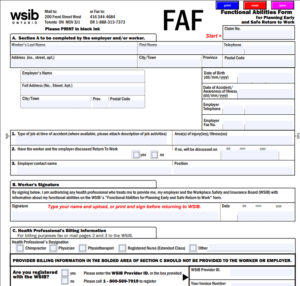As an employer in Canada, it is crucial to understand your role and responsibilities when it comes to disability claims.
Disability claims can arise when an employee becomes unable to work due to a physical or mental impairment. In such cases, navigating the process can be complex, and having a clear understanding of your obligations can help you effectively manage these situations while supporting your employees.
This article aims to provide you with a comprehensive overview of your role as an employer in disability claims in Canada.
Familiarize Yourself with Employment and Human Rights Laws
In Canada, several federal and provincial laws protect the rights of employees with disabilities.
The main legislation that employers should be familiar with includes the Canadian Human Rights Act and the provincial Human Rights Codes.
These laws prohibit discrimination against individuals with disabilities and require employers to provide reasonable accommodations to enable employees to perform their job duties.
Establish Clear Policies and Procedures
To effectively manage disability claims, it is essential to have clear policies and procedures in place.
This includes establishing a formal process for employees to report disabilities or medical conditions that may impact their ability to work.
By having well-defined procedures, you can ensure consistent treatment and facilitate a smooth transition when an employee needs to go on disability leave.
Accommodation and Return-to-Work Programs
Under Canadian human rights legislation, employers are required to accommodate employees with disabilities to the point of undue hardship.
Accommodations may include modified work schedules, providing assistive devices, making workplace modifications, or adjusting job duties. It is essential to engage in an interactive process with the employee to assess their needs and explore reasonable accommodation options. Developing a return-to-work program can be beneficial in assisting employees with disabilities to reintegrate into the workforce.
This may involve a gradual return to work, modified duties, or providing additional support as needed.
Maintain Confidentiality and Privacy
When dealing with disability claims, it is crucial to respect the privacy and confidentiality of employees’ medical information.
Employers should only collect information that is directly relevant to the disability claim and ensure that it is stored securely.
Sharing sensitive medical information without the employee’s consent can violate privacy laws and potentially lead to legal consequences.
Communicate Effectively
Open and transparent communication is key when managing disability claims.
Maintain ongoing communication with the employee on leave, keeping them informed of any updates or changes that may impact their return to work. Regularly check in with the employee to express your support and willingness to accommodate their needs.
Ensure that managers and supervisors are also aware of their role in facilitating effective communication and supporting employees with disabilities.
Obtain Expert Advice if Needed
Navigating disability claims can be complex, especially if the situation is challenging or unclear.
In such cases, it is wise to seek expert advice from legal professionals or human resources consultants with expertise in disability management. They can provide guidance on the legal requirements, best practices, and assist in ensuring compliance with applicable laws.
Independent Medical Evaluations (IME’s) and Functional Capacity Evaluations (FCE’s) can also be a valuable tool to assist in clarifying and underscoring an employee’s objective medical restrictions and limitations, prior to initiating a return to work plan.
Foster a Culture of Inclusion
Promoting a culture of inclusion is not only a legal obligation but also a smart business strategy.
By fostering a supportive and inclusive work environment, you can attract and retain talented employees and enhance overall employee morale and productivity.
Encourage diversity and provide training to your staff to raise awareness about disabilities, accommodations, and the importance of creating an inclusive workplace.
Summary
Understanding and fulfilling your role as an employer in disability claims is not only a legal responsibility but also an opportunity to demonstrate your commitment to supporting your employees and creating an inclusive workplace.
By taking the time to educate yourself about relevant laws, implementing clear policies and procedures, providing reasonable accommodations, maintaining confidentiality, fostering open communication, and seeking expert advice when needed, you can navigate disability claims with compassion, fairness, and compliance.
By doing so, you contribute to a positive work environment where employees feel valued, supported, and empowered to reach their full potential.
Remember, the effective management of disability claims not only benefits individual employees but also strengthens your organization as a whole.
FAQs About Employers and Disability Claims
Can an employer terminate an employee who has a disability?
No, employers in Canada are prohibited from terminating an employee solely based on their disability.
The Canadian Human Rights Act and provincial Human Rights Codes protect individuals with disabilities from discrimination in the workplace.
Employers are required to provide reasonable accommodations to enable employees to perform their job duties, unless it would cause undue hardship.
What qualifies as a reasonable accommodation for an employee with a disability?
Reasonable accommodations can vary depending on the individual’s specific needs and the nature of their disability.
Examples of reasonable accommodations may include modified work schedules, providing assistive devices, making workplace modifications, or adjusting job duties.
The key is to engage in an interactive process with the employee to assess their needs and explore possible accommodation options.
Can an employer request medical information from an employee regarding their disability?
Employers can request medical information from an employee if it is directly relevant to their disability claim or the accommodation process.
However, employers must handle medical information with utmost confidentiality and privacy. It is important to only collect information that is necessary and store it securely.
Sharing sensitive medical information without the employee’s consent can violate privacy laws.
Are employers required to have a return-to-work program for employees with disabilities?
While there is no legal requirement for employers to have a return-to-work program, it is highly recommended.
Developing a return-to-work program can assist employees with disabilities in reintegrating into the workforce effectively. This program may involve a gradual return to work, modified duties, or providing additional support as needed.
It helps facilitate a smooth transition and supports the employee’s successful return.
What can employers do to foster a culture of inclusion in the workplace?
To foster a culture of inclusion, employers can take various steps.
They can promote diversity, provide training to raise awareness about disabilities and accommodations, and emphasize the importance of creating an inclusive workplace.
By valuing and supporting employees with disabilities, employers can attract and retain talented individuals, enhance overall employee morale and productivity, and create a positive work environment for all.






